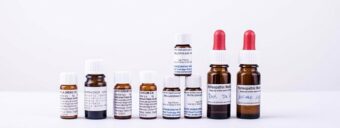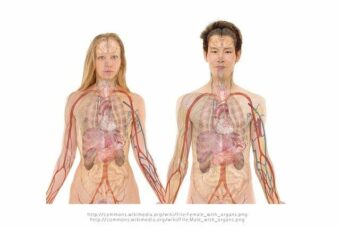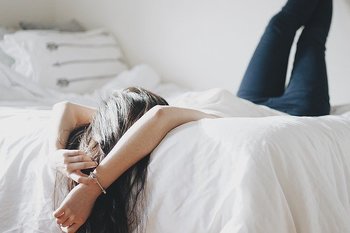The promising research surrounding how to use CBD for sleep problems, a compound in cannabis that doesn’t get you high, is enough for us to say “yes.” There’s no shortage of “natural” solutions out there claiming to be the ultimate cure for sleep problems. But can they deliver?
While we don’t yet have conclusive scientific support behind marijuana and sleep problems, we know that cannabidiol connects with receptors in the body and brain associated with relaxation and restful sleep.

What are the Best Ways to Use CBD for Sleep Problems?
CBD is a non-intoxicating compound found in the cannabis plant that offers several therapeutic benefits without the psychoactive or “high” THC.
CBD can be used to help you fall asleep and stay asleep longer, reduce the amount of time it takes to fall asleep, and reduce the number of times you wake up during the night.
Several research studies are currently underway. To see if CBD and other anti-sleep agents can be used safely to help address this sleep-disruptive issue.

CBD and Other Natural Oils and Balms
Gather a few essential oils and essential balms that are specially differentiated to implement a sleep hygiene regime.
Carrus: An essential oil that counterbalances yin, stress, and anxiety.
Rosmarinus: A remedy for insomnia.
Linalool: A therapeutic terpene that is anti-inflammatory, antihistamines, anti-nausea, anti-vomiting, anti-gemological, anti-depressant, and anticonvulsant.
Mint: The nostrum for blocking out noise, light, and heat.
Echinacea: Make tea for daytime doses for you to drop an hour into to unwind at night.
Jasmin: A plant that is calming, adaptogenic, and serves to alleviate anxiety.
Lavender: A tonic for the mind and body.
Benzoin: Deep detox for your body and mind.
Ginseng: Natural painkiller.
Oud: An effective sleep aid.
Primrose oil: Great for layering in warmer weather.

CBD for SHORT NAPS to SLEEP BETTER
Breaking the sleep-deprivation cycle might be the most revolutionary activity you can begin implementing to unwind and fall asleep.
Short overnight trips to your bed often produce positive results. Rob Ousbey, CEO of SleepZoo, recommends a 10-minute nap for 1 hour at least three times per week if you have a hard time falling asleep, but even more, frequent napping is OK.
For some, running, cycling, snowshoeing, or weightlifting while snoozing can ultimately provide the opportunity to get in a few hours of slow-wave sleep, which is the type of sleep associated with REM sleep.

Turn Up the SOUND
CBD can elicit a state of temporary relaxation when people work at low-to-moderate performance levels for a shorter amount of time.

How Does CBD Work in the Body?
CBD works by activating the body’s serotonin 5-HT1A receptor sites. These receptor sites are found mainly in the brain and are involved in the modulation of anxiety and depression.
When CBD is used, it engages with these receptor sites to produce an antidepressant effect.
While we don’t yet have enough studies and research to ponder it as a definite sleep aid, U.K. researchers noted in a 2014 study that those who took CBD for four weeks exhibited “marked alterations” in sleep patterns.
The exact mechanisms are still unclear, but researchers stated you might feel a little tired during the day if you take CBD., particularly during the first few hours after taking it.
You shouldn’t be construed as a sleep booster, though. Suppose you take the above advice and notice that moving to a state of CBD-resistant sleep has alleviated your insomnia.
In that case, we applaud you — your sleeping strategy may improve.
That cannabis barrier drops, put into a mother’s bloodstream, can temporarily interrupt the attachment process with the fetus, causing what researchers call a “cushioning mechanism.”
Theoretically, this action results in the fetus reworking its wiring to keep the baby safe and secure during the time you’re experiencing your periods. Separate from the ordinary course of your life.
We’re not suggesting you smoke at home the night before (or rein it in) to drop 20 pounds in one sunset-magnet session suddenly. We’re advocating for some age-old sleep hygiene to be put to the test to see if and when it pays off.

What are the Side Effects of CBD for Sleep Problems?
To get the most out of your cannabis consumption, be sure to consider where it’s legalized. Laws are changing worldwide, and what once was hippie has now become a majority vote.
It’s important to know what you’re getting when you buy (or try) because individual states have different restrictions in place.
Expected sleep benefits of cannabis use include improved sleep quality and decreased insomnia. Let’s take a look at how hemp-derived CBD might solve those problems. Sleep problems often stem from poor sleep structure.
Flawed sleep architecture is what introduces REM sleep to your system before it’s time to fall asleep. In this state, deep sleep resides primarily in the posterior (forward) hemisphere of your brain, while waking up periods occur mainly in the frontal lobe.
On the other hand, REM sleep is predominantly in the left hemisphere. She was described as having dull or restorative sleep.
If you’re not getting enough REM sleep, you aren’t producing the hormones necessary to induce sleep at night.
If you try to jump-start the production of those same hormones by getting some quality rest in the middle of the night, well, you may jack-rush into bed with little-to-no sleep and try your hardest not to wake up.

The Benefits of CBD a Better Sleep Habit
Research has linked REM and waking sleep deprivation to increased levels of depression, anxiety, and fatigue. But that’s not the only benefit.
Slow-wave sleep, also known as slow-wave or deep sleep, comprises light sleep stages 1-3. — establishing deep sleep patterns associated with promoting memory consolidation and cognitive function. REM is also vital to consider.

What are Some Other Natural Solutions for Sleep Problems?
According to the National Sleep Foundation, the best natural solution for sleep problems is to keep a consistent sleep schedule.
Still, if that’s not possible, it’s also important to avoid stimulants like caffeine and alcohol before bedtime and to exercise regularly during the day.
That said, regularly switching things up and switching up your sleep schedule can help you get better quality shuteye.
An analysis of 16 studies on CBD indicated that it might be beneficial for preventing insomnia and improving sleep quality and quality of sleep.
Trying a new medicated sleep remedy without proper guidance from your doctor first can put you at risk for a harmful reaction or increased chances of side effects.
“Cannabidiol is quite different from traditional medications. Like antidepressants, antihistamines and pain relievers in that it’s absent those pesky side effects of medication,” explains Amy Leigh Mercogliano, a licensed clinical psychologist.
Instead, CBD’s vital evidence-backed brain-science research suggesting it’s linked to decreased anxiety, a decreased risk of alcohol and substance abuse, and reduced depressive symptoms.
It might also be helpful for pregnant women with anxiety who are not getting enough sleep; Mercogliano points out this is the part you’re probably dreading: There’s a lot of research supporting the efficacy of cannabidiol for sleep issues.
A 2017 study published in the journal Sleep found participants who took CBD before bed could sleep better and showed significant decreases in fatigue five days after using CBD.
People typically maintained drowsiness for up to 50% of those who took CBD. The researchers also found CBD to be an effective treatment for sleep apnea and decrease the incidence of early morning awakenings. Plus, there’s anecdotal evidence suggesting CBD is an effective pain reliever.
While research is still limited, it seems like the sky is the limit regarding sleep supplements and new sleep treatments.
Does CBD Help You Relax
While there isn’t any conclusive scientific evidence that marijuana helps with sleep, studies have shown that CBD can help to relax you and chill you out, making it a good choice for people who have trouble sleeping.
In the end, there isn’t any conclusive scientific evidence that marijuana helps with sleep. Still, there is much anecdotal evidence from people who have seen the benefits of using cannabis to help them sleep.
Additionally, studies have shown that CBD can help to relax you and chill you out, making it a good choice for people who have trouble sleeping.
“People don’t necessarily go to sleep with a marijuana plant in their bed. But cannabis seems to help them go into sleep at a better time,” states Dr. Paul Thompson, president of the American Sleep Association.
“CBD is relaxing and, in some cases, bedtime oils can help to do it as well.”
While getting high off of cannabis is rare, that doesn’t mean you can’t benefit from inhaling CBD. Even shallow doses of the drug — about 3–4 milligrams smoked, generally — help produce some effects, such as those associated with sleep improvements.
“The experiments seem to show that when you take high amounts of the drug.”
You get more therapeutic effects. Listing in patients what I’m going to call sleep benefits,” states Joel Miller, a chiropractor in Colorado and spokesperson for the American Chiropractic Association (ACA).
“I can’t say it’s as good as actual sleep, but it’s better than a placebo.”
Though the drug’s short- and long-term effects are mixed, some studies suggest it may improve sleep. Two small studies looked at chronic heavy alcoholics and found moderate-to-high doses of CBD improved sleep.
Another study also looked at chronic pain sufferers and found CBD may provide long-term benefits, such as reduced tension, anxiety, and sleep disturbances. That said, too much is generally not a good idea.
If you decide to try CBD or hemp, know a few things to consider: consult with your care physician before complimenting your medical itinerary.
This is the online destination for CBD products.
CBD offers natural, effective pain management.

Using the correct combination of cannabinoids can ensure that you are getting the most out of your cannabis. These benefits are only available when you use the right product for your needs.
Cheers,
Kevin

